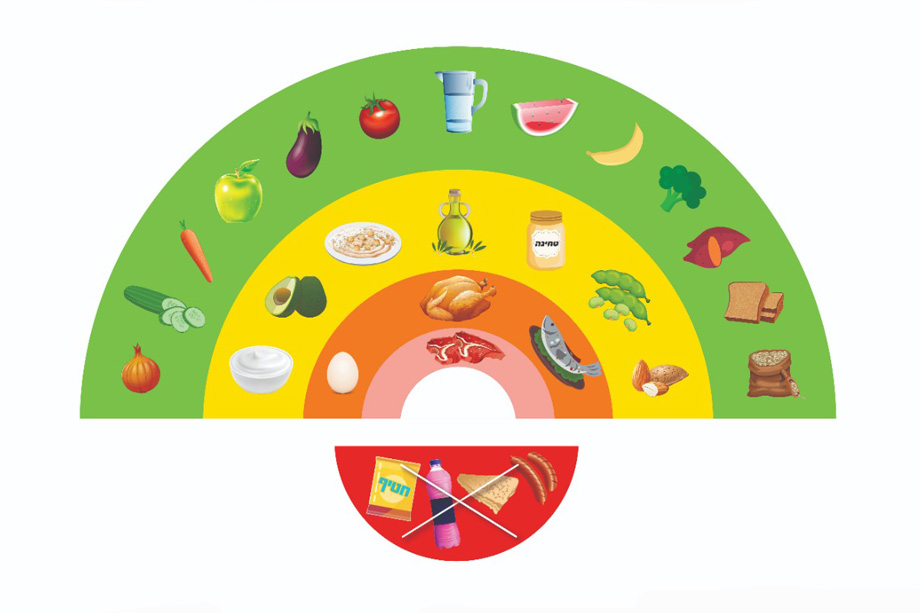
Image: Oren Shalev
Why are the updated dietary guidelines essential?
Modern consumption and dietary habits are often based on processed and industrialized foods that are eaten absentmindedly and quickly, not always with family or friends, and in many cases in front of screens that are found everywhere nowadays. The government dietary guidelines, put together by the Division of Nutrition of the Israel Ministry of Health, seek to address all aspects of this reality. For the first time, they include not only lists of recommended foods but also references to how we eat the food, where does it come from, and our physical exercise habits.
The key government dietary guidelines
Preferring natural foods or those closest to raw foods
It is more beneficial to consume natural foods or foods that have undergone minimal processing (with as little additives as possible, but not additives one can’t find in a home kitchen), home cooked meals and fresh dishes. It is also important to drink plain water (slices of fruit can be added for color and flavor) instead of sodas and juices. Processed sweets and snacks with saturated fats, sodium (salt) and added sugar – should be replaced with vegetables and fruit, home cooked food, soup, whole grain salads and legumes or steamed vegetables.
Sustainable diets and preferring local produce
When a diet is mainly based on food from plant sources and smaller quantities of meat, there is less ecological environmental damage than a diet based largely on meat. The more a diet is based on natural foods, the less food packaging is disposed of.
Less sugar and salt
It is important and recommended to gradually become accustomed to the natural taste of foods and to drink plain water. It is worthwhile to learn how to gradually reduce adding salt and sugar to food and their substitutes. Pure dried herbs and spices without salt or other additives can be used for flavoring. If salt is used, iodized salt is preferred.
What and how much? Meals based on the nutritional rainbow

The key principles provide a general and wide framework that is based on frequency (every meal, every day, once a week etc.) of eating each of the four food groups, and everybody can adapt them to their tastes, preferences and habits:
- Diversity on a daily basis: vegetables, fruit and whole grains.
- At least once a day, a serving of any of the following groups: legumes, vegetable oils (such as olive oil, tahini oil, nut oil, avocado oil), non-sweetened dairy products and their substitutes.
- Diversity on a weekly basis: fish (fresh or frozen, not salted or smoked), chicken, turkey and eggs.
- Up to 300g a week: one serving of red meat, preferably lean.
- Avoid or reduce significantly the consumption of the following foods: processed meat, sugar sweetened foods, snacks, salted and roasted nuts and seeds, cakes, cookies, various salty pastries.
- Beverages: it is important to become accustomed to drinking only plain water (slices of fruit can be added for color and flavor), completely avoid diet soft and sugar-sweetened drinks, and consume as little alcoholic beverages as possible.
New diet tips for an active and healthy lifestyle

Exercise should be routine
Regular meals, preferably with friends or family, sitting at the table
Cooking and preparing home-made meals from raw food supplies
Informed purchasing of food products , reading nutritional information
Sufficient sleep, 7-8 hours for adults, 10-12 for children
The nutritional rainbow: not only healthy - it's economic, social and ecological, too
Adopting the new dietary guidelines helps the economy, society and the environment and reduces ecological harm (such as contamination caused by transporting packaging waste far away). In addition, combining a physical activity with these guidelines reduces the risk of obesity and associated diseases and expenses.
The benefits of a Mediterranean diet
Health:
Reduced risk of obesity and associated illnesses. Reduced risk of heart diseases, diabetes and more.
Economy:
Natural unprocessed foods are cheaper.
Ecology:
Less waste contamination.
Society - culture
Shared cooking and intake of food.
Further reading
Health on the plate – the benefits of the Mediterranean diet / Ministry of Health (Hebrew)
Mediterranean diet for promoting a healthy diet – how to cook legumes and whole grains (Hebrew)
The new government dietary guidelines / the Ministry of Health (Hebrew)
Posters you can print and share
The nutritional rainbow diet - printable poster in Hebrew (70*50)
The nutritional rainbow diet - printable poster in Hebrew for the Haredi sector (70*50)
The nutritional rainbow diet - printable poster in English (70*50)
The nutritional rainbow diet - printable poster in Arabic (70*50)
The nutritional rainbow diet with the four dimensions - Hebrew
The nutritional rainbow diet with the four dimensions - Arabic
The nutritional rainbow diet - Guidance for the public - Hebrew
The nutritional rainbow diet - Guidance for the public - Arabic
The nutritional rainbow diet - Video (Hebrew)
The nutritional rainbow diet - Video (Arabic)




